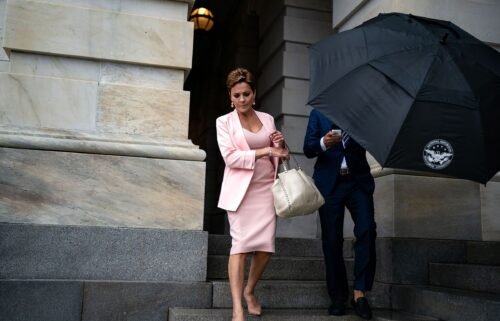In wake of Florida law, additional states seek to restrict certain LGBTQ discussions in schools

Revelers celebrate during the Tampa Pride Parade on March 26
By Shawna Mizelle, CNN
Bills similar to Florida’s controversial legislation that bans certain instruction about sexual orientation and gender identity in schools are being considered in at least 15 states, data compiled by the American Civil Liberties Union and reviewed by CNN shows.
Some of the bills go further than the Florida law, dubbed by its critics as “Don’t Say Gay,” which sparked a furious nationwide discussion about LGBTQ rights, education policy and parental involvement in the classroom.
The debate reflects the sensitive forces of LGBTQ rights becoming increasingly ascendant at a time when some parents are seeking greater input in their children’s education, especially in the wake of the tumult wrought by the Covid-19 pandemic.
Republicans, arguing that discussions around gender identity and sexuality are inappropriate for young children, have used the banner of “parental rights” to push for a curtailment of such conversations in schools, even though opinions on the matter vary widely among parents. LGBTQ rights advocates see a conscious decision to stigmatize a vulnerable slice of American society and a potential chilling effect on what they believe to be urgently needed discussions.
“These bills are predicated on the belief that queer identities are a contagion while straight, cisgender identities are somehow more pure or correct,” Gillian Branstetter, a communications strategist for the ACLU, told CNN. “In truth, every student has a right to have their own life stories reflected back at them and every student benefits from stories that serve as a window into the lives of people different from them. Censorship and homogeneity benefit no one while denying all students an equal chance to learn, grow and thrive.”
The ACLU has tracked a total of 61 bills across 26 states, though efforts in several states, including Mississippi and Montana, have already failed. Earlier this month, Arkansas approved restrictions against such discussions through the fourth grade.
Ultimately, it’s unclear how many of the bills will be enacted. A Human Rights Campaign report released in January said that of 315 bills that they viewed as anti-LGBTQ that were introduced nationwide last year, only 29 — less than 10% — became law.
Efforts resemble Florida law
Florida’s law, titled the “Parental Rights in Education” bill, prohibits classroom instruction about sexual orientation or gender identity in kindergarten through third grade “or in a manner that is not age-appropriate or developmentally appropriate for students in accordance with state standards.” It also requires districts to notify a student’s parent if there’s a significant change in their mental or emotional well-being, which LGBTQ rights advocates argue could lead to some students being outed to their parents without the student’s knowledge or consent.
“We will continue to recognize that in the state of Florida, parents have a fundamental role in the education, health care and well-being of their children. We will not move from that,” Gov. Ron DeSantis, a Republican, said when he signed the bill in March 2022.
According to the Movement Advancement Project, a nonprofit think tank that advocates for issues including LGBTQ rights, Florida’s law was the catalyst for the bills currently under consideration in other states, which include:
- An Iowa bill that passed the state House last week that would prohibit instruction about gender identity and sexual orientation from kindergarten through sixth grade.
- A bill in Oregon that would prohibit any discussion on sexual identity for grades kindergarten through third grade without parental notification and consent.
- Legislation in Alaska that would require parental notification two weeks prior to “any activity, class or program that includes content involving gender identity, human reproduction or sexual matters is provided to a child.”
- Multiple bills in Florida that seek to double down on last year’s legislation, including one that requires instruction that “sex is determined by biology and reproductive function at birth” and another that prohibits requirements for employees to use pronouns that do not correspond with a student’s sex.
A recurring theme in the legislation is a requirement that school employees notify a parent if a child expresses a desire to be addressed by a pronoun that matches their gender identity if it differs from the one assigned at birth.
“We’re not saying that you can’t do this,” Washington Republican state Sen. Phil Fortunato, who introduced legislation that would limit instruction on gender and sexual identity for kindergarten through third grade, told CNN. “I mean, I disagree with it, but, you know, if the parents and the child agree with it, that is their decision. But they shouldn’t be doing it behind the parent’s back when their kid goes to school. And that’s the point of the bill.”
Missouri’s bill is uniquely far-reaching: no employee at a public or charter school would be allowed to “encourage a student under the age of eighteen years old to adopt a gender identity or sexual orientation,” though what the law means by “encourage” is not explained. School officials would be required to immediately notify parents if their child confides in them “discomfort or confusion” about their “official identity” and teachers would not be allowed to refer to a student by their preferred pronouns without first securing a parent’s approval.
The bill specifically calls for whistleblower protections for school employees who report violators, who would then face “charges seeking to suspend or revoke the teacher’s license to teach based upon charges of incompetence, immorality or neglect of duty.”
In a blog post entitled “Evil perpetrated on our children,” Missouri GOP state Sen. Mike Moon, who sponsored the legislation, called it a “lie that boys can be changed into girls and girls can be changed into boys.”
“One thing we must agree on, though, is that parents are responsible for the upbringing of their children,” he continued. “To that end, parents must be involved in the education of their children.”
Legal challenges likely
The measures are likely to face swift legal challenges if enacted, though at least two efforts to block Florida’s law have so far failed to take it off the books. One of those lawsuits, brought by a group of students, parents and teachers in Florida, was thrown out last month by US District Judge Allen Winsor, a Trump appointee, who said the challengers were unable to show that they’ve been harmed by the law.
“Plaintiffs have shown a strident disagreement with the new law, and they have alleged facts to show its very existence causes them deep hurt and disappointment,” Winsor wrote in his order. “But to invoke a federal court’s jurisdiction, they must allege more. Their failure to do so requires dismissal.”
At the heart of opponents’ concerns is the vagueness in the laws’ language as written. LGBTQ issues are not generally a formal part of public school curricula, they point out, leaving educators with the prospect of having to determine where legal fault lines are drawn with nothing less than their careers at stake.
“What counts as classroom discussion? As classroom instruction? Does it just include the curriculum for the class?” asked Alice O’Brien, the general counsel for the Alice O’Brien, in an interview with CNN. “For example, does it include teachers’ lesson plans, or does it sweep so broadly as to include classroom discussion? A teacher answering a student’s question, a teacher perhaps intervening in an incident where one student is bullying another student because of that student’s prestige, sexual orientation or gender identity? It’s very unclear what is prohibited and what is not prohibited.”
There are other concerns. Naomi G. Goldberg, the deputy director of MAP, worries about a “chilling effect on teachers themselves in terms of their ability to support students in the classroom as well as the students themselves in the classroom.”
A similar point was made in a CNN op-ed last year by Claire McCully, a trans mother who is outraged over Florida’s law.
“Like any other parent, I expect my family to be welcomed and accepted by others at the school,” McCully wrote. “And of course, this acceptance might be more likely if some of the children’s stories read in classrooms feature two dads, two moms or even a trans mom.”
Cathryn Oakley, the state legislative director and senior counsel of the Human Rights Campaign, told CNN that using a student’s preferred pronouns is harmless to other students but deeply meaningful to trans children themselves. She urged a cautious approach that recognizes the need for schools to be a safe space for vulnerable children, particularly if there is a risk that outing a child before they are ready could lead to “family rejection or even violence.”
“No one is suggesting that this is information that won’t be relevant to parents,” she said. “But what we are saying is that young folks should be able to have this conversation on their own terms with their parents and not have a third party be forced to broker a conversation that could put that child in danger.”
The-CNN-Wire
™ & © 2023 Cable News Network, Inc., a Warner Bros. Discovery Company. All rights reserved.
CNN’s Devan Cole contributed to this report.



